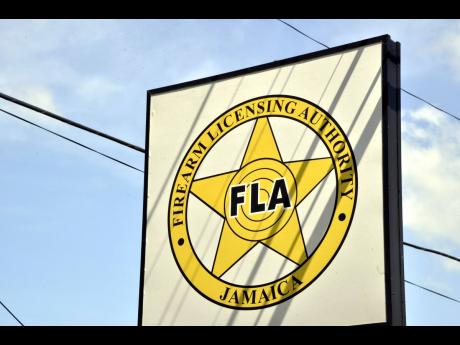Judge blocks defamation claims by FLA ex-officers
Two former senior officers of the Firearm Licensing Authority (FLA) yesterday suffered a huge blow after the Supreme Court refused to grant them an extension to file a defamation claim, which was initially made outside the limitation period.
The two claimants – Michael Dixon, the former director of audit and complaints, and Andrew Gordon, a former senior audit and complaints officer – are contending that they were defamed following publications by four media entities, including The Gleaner, after they were dismissed from their jobs in 2017.
They have signalled their intention to challenge yesterday’s ruling.
Under the Defamation Act, which was passed in 2013, a claimant in a libel suit has only two years after the alleged libel has been committed to bring a suit.
In this case, the two claimants, who are pursuing the matter separately, both filed claims in October 2020.
The claimants alleged that their contracts of employment at FLA were terminated with immediate effect about August 22, and in the same week, the respondents – which also include RJR, Jamaica Observer and TVJ News – published several articles with alleged defamatory statements concerning the circumstances of their dismissal and their alleged involvement in corruption while employed to the FLA.
The men then engaged the services of attorney-at-law John Junor to challenge what they believed was their unfair termination via the Industrial Disputes Tribunal (IDT) and the defamation case.
They are contending that the alleged defamatory statements have negatively affected their reputation and have caused them to be ridiculed in the government sector.
They are also claiming that they have suffered prejudice and hardship to date.
However, Junor admitted that he was under the impression that the statutory period was six years and that it was a colleague who had brought it to his attention in 2020 that the statutory limitation had been reduced to two years.
According to Junor, he was caught up with the IDT aspect of the matter, which took supremacy and was well under way.
Lawyer took responsibility for late filing
The lawyer, in his affidavit, accepted responsibility for the late filing and asked that the claimant not be denied their time in court due to his inadvertence.
He indicated that the prejudice which the applicants have faced and will continue to face if the application is not granted outweighs any prejudice the respondents might suffer if the application were granted.
In making the application for the court to extend the limitation period, attorney-at-law Bert Samuels, who, along with Michael Hyatt, is now representing the claimants, argued that under the act, the limitation period can be waived if there are reasonable and compelling grounds for the action not having been brought within the limitation period, if there is prejudice to the respondents, and if the judge is satisfied it would be in interest of justice.
According to Samuels, the explanation proffered by Junor was sufficient to satisfy the reasonable and compelling grounds.
Samuels also asserted that his clients had real prospect of success for the claim.
However, the lawyers for the respondents argued that the delay was inordinately long as three years had passed since the alleged cause of action arose and a year and two months past the limitation period.
They further argued that the reason stated was not compelling and amounted to negligence on the part of the attorney and that negligence has never been a strong limitation defence.
The respondents also submitted that they would be prejudiced in their defence by the unavailability of witnesses and records relating to the alleged defamatory statements were the court to grant the application to extend time.
The representative for The Gleaner, TVJ and RJR indicated in the affidavit that the entities were not notified of a potential claim and as such, the standard procedure to preserve the documents to be able to respond was not followed.
Reporter migrated
In the case of The Gleaner, it was reported that the reporter who did the story had migrated to Canada and was no longer in contact with the company and there was no way to contact him.
Similarly, the affidavit said the identities of the reporters who produced the TV and radio reports were not available as the newsroom software data was changed approximately three years ago, post-publications, and as such, they were unable to access the old scripts and data with the names of reporters for the stories.
The entities said that as a result, they would be unable to defend the claim and would not have any witness if the extension was granted.
The Jamaica Observer, in its affidavit, made a similar claim after indicating that it, too, was unable to find out who had authored or uploaded the story that was published by the paper due to a built-in automatic system which removes the information after a set period.
Meanwhile, Justice Grace Henry McKenzie, in her written judgment following her ruling yesterday, said that the reasons given by the claimants were not reasonable and compelling and that the court cannot distinguish between the lawyer’s action from the clients, who she notes did not take any steps to ensure that their matter was filed on time.
The judge also indicated that due to the passage of time, it would not be fair to the respondents to answer to a claim which they may not be able to adequately defend.
Cost was awarded to the respondents.
Samuels, when contacted for a comment, noted that he had not yet read the ruling, but said, “The provisions of this law are new and permits persons to come outside of the limitation period, and this is the first case of its kind for the new act and, therefore, this decision is worthy to be tested on appeal.”
Attorney-at-law Charles Piper led the team which represented The Jamaica Observer, while attorney-at-law Stephanie Williams represented the other respondents.

